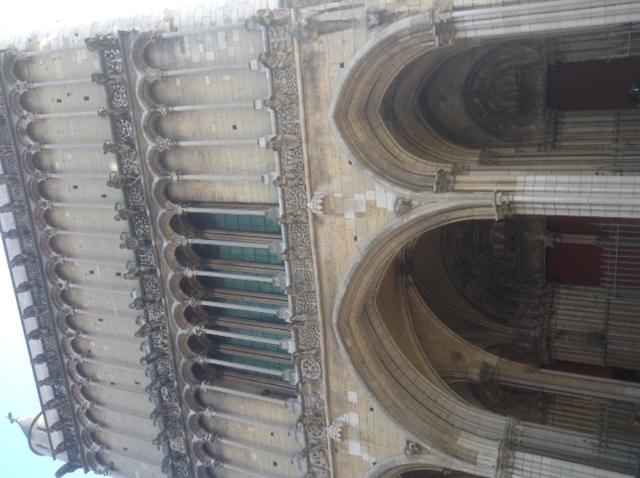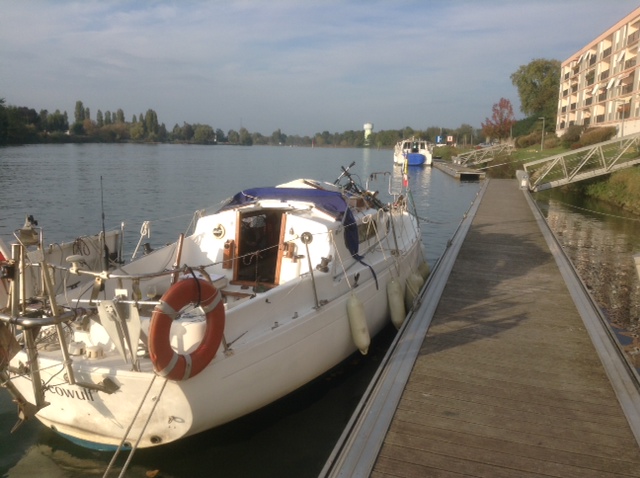First day single handed

Beowulf
Tom Fenton and Faith Ressmeyer
Sat 4 Oct 2014 17:46
Auxonne. What should be a quiet riverside mooring. Actually I am moored beneath dull, Stalinist, rectangular apartment blocks. And the river just here us for jet skis and water skiing, and I have been rocking and rolling sundae I arrived.
What a day. We rose at 6, breakfasted, and locked the boat at 7, to set off for the station and the train to Dijon, waking through thick river mist, in which the shapes of the great barges and the bridge lights were pure Whistler. It was still dark when we reached the station, and the warm lobby where we waited, as instructed, until we composted our tickets and made our way to the platform two minutes before departure. If this is 21st century public rail transport, why is Britain still in the 20th century? The comparison with the line and rolling stock on the London to Norwich intercity line is embarrassing. I want to pay proper taxes and have my government invest in modern infrastructure. Privatisation has failed us.
Dijon was the, or a, centre for the might of the dukes of Burgundy. I wish I knew more about them. They must have been very wealthy. The public buildings and monuments are fantastic. We took a short walk around the old city centre. Heart of it all is Notre Dame, with a West facade (therefore not in sunlight while we were in the city) covered in amazing gargoyles. Here is my best effort to depict them. As well as the three rows gof gargoyles, the delicate columns suggest pure elegance.
Then we returned to the station and Faith caught the 11:22 to Lyons St Exupery, which no one could reassure us was the and as the Airport. The train had a different number, okay only one digit different. I asked a platform attendant about this difference. "C'est normale," she said. Maybe, but that does not help confidence.
I caught the train back to St Jean an hour later. Walking back from the station a young guy, black if I may add that, stopped his car and offered me a lift. Saved me a half hour walk. Très gentil.
Peter lent me his hose and I filled the water tank and spare cans. Both Peter and John, an Aussie we had also met yesterday, asked me whether Faith made the plane, and just then I got confirmation she was in airport security.
Then off. On my own. Thank goodness for Sadie, our tiller pilot, or automated steering device. Sadie took me up river while I sorted out all the ropes, fenders, and fender board. Auxonne was only about 17 kilometres, and very pretty they were, but nothing and no one prepared me for the trial that was to come, the Auxonne lock. "You'll have no trouble at all." They all said.
What actually happened was this. The lock was closed when I arrived, and there were three cruisers ahead of me. After an interminable time, two boats came out downstream and two of the boats ahead entered the lock. The third boat had turned downstream, and clearly gad changed its mind, so I approached the lock. It was tiny. It seemed you could only get two boats in there. I hovered for a while, the boat in front lying sideways across the full width of the lock, then decided not to risk entering too. After hovering for another quarter hour, when it was clear nothing was coming down, I tried to start the automatic system. You approach the lock and a huge hose dangles in from of you. A sign says turn once only. Actually turning it at all is tricky. First pass you have to choose between the signal and your boat. Second pass you try to turn it once but it only does a quarter turn. Now you notice that as well as the 'lock closed' light, there is a flashing orange strobe. You have no idea what this means. There is nothing in the book as far as you can see about a flashing orange strobe. You consult the book while you do tight turns in mid river with the depth alarm turned off because it us sounding the whole time. You have another go at the dangling hose. You approach very slowly and twist it vigorously in both directions. You start to look for the telephone number in the book. Then some sympathetic person hails you from the shore to draw your attention to the fact that the lock preparation lights have come on. You breathe a sigh of relief, and wait. Ten minutes later the gates open and you put the engine in gear and motor forward. As you enter the lock, you realise (a) there are no floating bollards, vertical rods or anything at all to put a line to, and the bollards on the quay above are far out of reach even if you were on tip toe on the cabin roof with a long boathook. You have explored the whole lock, you reverse to the ladder and tie up to it, realising that if the water level were to rise you would be pulled under. You climb the ladder with the bow line, which you have just transferred fro port to starboard, and make it fast round a bollard. As you descend the ladder you realise a boatload of German holidaymakers, all male, none sailors, probably had beer for breakfast, are also trying to enter the lock. Your stern is in their way. You are half way down the ladder. You descend, to find your boat had moved forward and there is nothing to step on to. You are adroit and somehow land on the boat. You take a stern line and climb up again, find a bollard to put it around, and descend to repeat the problem. The Germans have gone ahead and are across the lock with a bow line on starboard and a stern line on port, and therefore are across the lock. They seem very happy and pleased with themselves. They start to shout at you and it is clear that progress depends on you. They have no English and you have no German. Someone gesticulated and so done else says Blue. You are half way up the ladder again when you realise that there are two rods recessed into the lock wall that you had thought were electrical, one blue and one red. You try to manipulate the blue one. Nothing happens. You try again. And eventually you use brute force and push it upwards vertically some four inches and a bell rings. You rang the bell for Blaenau (See Dylan Thomas, August Bank Holiday Monday). Everyone relaxes. The gates behind you close. The water rises. The Germans are all over the place and perfectly happy. A Frenchman leans over the parapet and smiles. You realise you have done a round turn and two half hitches on the bollard to which you attached the bow line. You ask him if, when you have risen fully, he would release the line for you. He assents, and congratulates you on your French. You demur. He makes slighting remarks about the German seamanship, which you refuse to be complicit with. When you are at the top, having remained in a sensible and orderly fashion parallel and close to the wall, you find you can reach the knot anyway. You make it into a slip, and, when it is time, you slip, then slip the stern line, and you are away.
You look at the chart and see to your horror more lock gated before Auxonne. But when you get there you find they are 'ancien' and you sail through to the town quays.
And so here I am. It is dark now, the skiers have left, and there is hope I will get a calm night. Tomorrow I must find the supermarket, which Peter warned us is the last one for many, many miles. Shoot. I want to get on. Every day away from Faith is going to be torture. Like today was.

